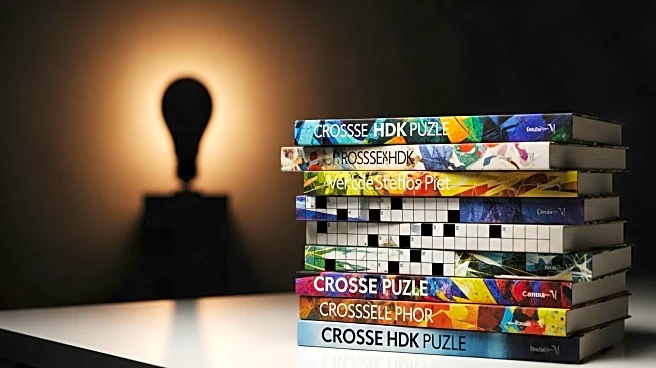What is the story about?
What's Happening?
A recent crossword puzzle published by a creator in The New York Times features a theme that plays on the names of famous individuals, challenging solvers with generational knowledge. The puzzle includes entries that require filling in blanks with names like Irving Berlin and LeBron James Worthy, highlighting the creator's effort to balance familiarity across different age groups. The puzzle's creator also shares insights into the process of developing the theme, which involved replacing less universally recognized names with more widely known figures. Additionally, the creator is venturing into the business world with a new board game called TOSSWORDS, marking a shift from traditional crossword construction to game development.
Why It's Important?
This development underscores the evolving nature of crossword puzzles, which must adapt to the changing cultural landscape and the diverse knowledge base of solvers. By incorporating generational themes, the puzzle creator addresses the challenge of engaging a broad audience, from older solvers familiar with historical figures to younger ones who may not recognize them. The creator's foray into the board game market with TOSSWORDS also reflects a broader trend of diversification among content creators, who are exploring new avenues to reach audiences and monetize their skills. This move could inspire other puzzle creators to innovate and expand their offerings beyond traditional formats.
What's Next?
The success of the TOSSWORDS board game will likely determine the creator's future direction in the gaming industry. If well-received, it could lead to further game development and potentially influence other crossword creators to explore similar ventures. The reception of the crossword puzzle's generational theme may also prompt discussions within the puzzle community about the balance between nostalgia and contemporary relevance, potentially influencing future puzzle designs.
Beyond the Headlines
The puzzle's generational theme raises questions about cultural literacy and the role of puzzles in preserving historical knowledge. As society becomes more digitally oriented, traditional puzzles like crosswords may serve as a bridge between past and present, offering a unique way to engage with history and popular culture. The creator's business venture also highlights the entrepreneurial spirit within the puzzle community, suggesting that innovation and adaptability are key to sustaining interest in this classic pastime.

















